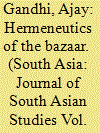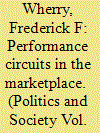| Srl | Item |
| 1 |
ID:
144363


|
|
|
|
|
| Summary/Abstract |
This paper presents an ethnographic study of a redevelopment controversy in Delhi's old city. It considers the perspectives of traders, hawkers, politicians and officials on the proposed revamping of the Meena Bazaar. The paper illustrates how hermeneutic and aesthetic dimensions suffuse public and political life in India. Specifically, sincere intentions, evoked in speech and performance, are seen as a prerequisite of public presentation and as a locus of interpretive scrutiny. In an ambiguous and indeterminate milieu, promises and motives are probingly assessed, often in ironic and dramaturgical form. The paper foregrounds the ‘hermeneutics of the bazaar’, an interpretive sensitivity to intentionality, and ‘structured sincerity’, the efficacy, and reflexive steering, of performed conviction.
|
|
|
|
|
|
|
|
|
|
|
|
|
|
|
|
| 2 |
ID:
113833


|
|
|
|
|
| Publication |
2012.
|
| Summary/Abstract |
This paper introduces the concept of performance circuits as a means for understanding economic transactions. The concept of the performance circuits emphasizes the script-like sequences and the existing cultural narratives that enable the believable performances of those scripts. The concept of performance circuits allows for Zelizer's concept of relational work to be applied in ethnographic studies of economic life, decomposing the constituent parts that enable the accomplishment of value in the marketplace. The paper opens with a dramaturgical performance at the United States Federal Reserve and then turns to microstudies of handicraft production, modern art markets, and neighborhood branding to demonstrate how one can study market dramas unfolding, sometimes unremarkably, emotions being generated, and background representations making loosely scripted actions understandable.
|
|
|
|
|
|
|
|
|
|
|
|
|
|
|
|